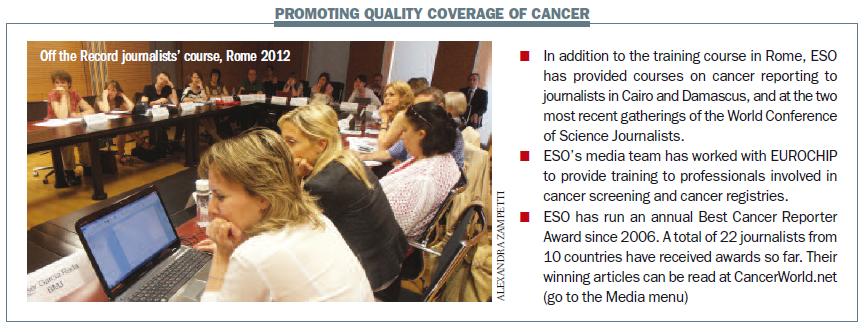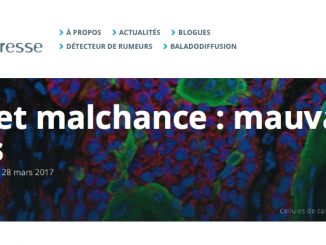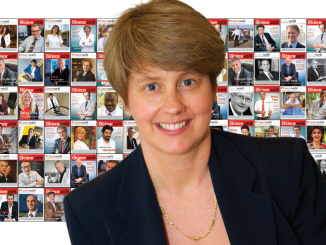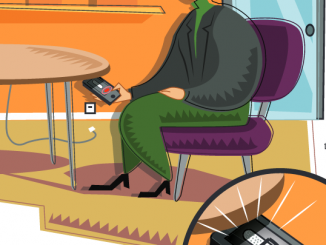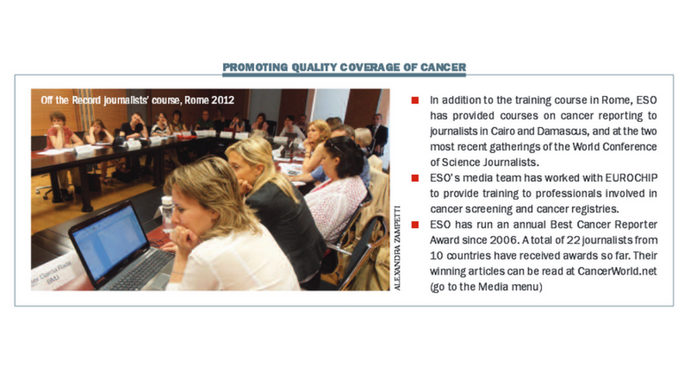
Knowing what needs to be done is one thing. Making it happen is quite another. Well-informed media stories that highlight shortcomings and failings can help focus minds on the need for urgent action.
The media plays a critical role in creating political momentum for change to improve health services, according to the UK’s National Cancer Director, Mike Richards. He speaks from personal experience, as it was a combination of evidence-based statistics and human interest stories that, in 1999, triggered the then Prime Minister Tony Blair to appoint him as what the media quickly dubbed ‘the Cancer Czar’.
Richards would prefer not to be in the public eye, but says that media attention is essential if things are going to change. “My appointment was greeted as good news for about 24 hours and after that all the bad news stories came out about people not getting treatment and about late diagnosis. We were deluged with bad news and I got experience very quickly in dealing with the media.
“Let me be honest, I have ambivalent feelings towards the media. I measure my success by how rarely I have to do the [BBC Radio] Today programme. I don’t need the publicity – I am not trying to get elected. But I know that we need those bad news stories. If all the journalists stopped criticising and said cancer is wonderful, my ability to move things would be diminished.”
Richards was speaking to broadcasting and print journalists at an ‘Off the Record’ training course, ‘Can Europe cope with the rising burden of cancer?’ organised by the European School of Oncology (ESO) and the European Broadcasting Union (EBU) on June 18 and 19.
The EBU has a record of high-quality media briefings for broadcasters in Europe, but this was the first time that they had tackled a critical health issue such as cancer. ESO, which provided the expertise and content for the training event, has organised a number of initiatives to bring together cancer specialists and journalists in various settings and parts of the world, but this was the first time it had focused on broadcast journalists. The event was organised as part of ESO’s contribution to the European Partnership for Action Against Cancer. It was co-financed by the EU Health Programme and was held in conjunction with the Partnership’s Second Open Forum, which was hosted by Italy, and held in the Ministry of Health in Rome.
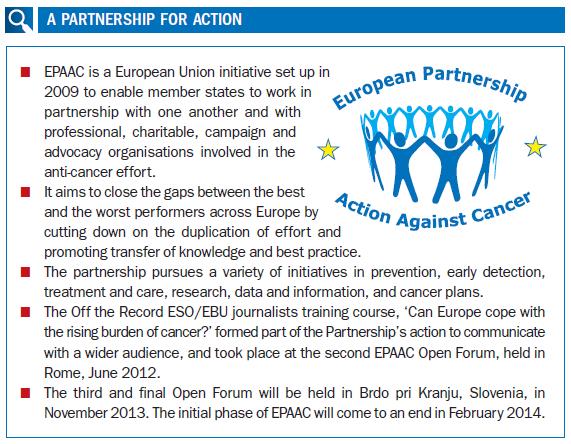 ESO’s primary focus is on giving doctors and other health professionals access to the knowledge that they need to give patients the best possible treatment and care. But Kathy Redmond, editor of ESO’s magazine Cancer World, sees working with journalists as a significant part of the ESO brief to educate and explain the complexities of cancer and to improve public understanding of the disease. “There needs to be much more engagement between the cancer community and the mass media. There is a disconnect between what the media usually highlights and what people need to know. Whether it means to or not, the media shapes public attitudes, beliefs and knowledge about cancer and has a responsibility to ensure that what it writes or broadcasts is correct.”
ESO’s primary focus is on giving doctors and other health professionals access to the knowledge that they need to give patients the best possible treatment and care. But Kathy Redmond, editor of ESO’s magazine Cancer World, sees working with journalists as a significant part of the ESO brief to educate and explain the complexities of cancer and to improve public understanding of the disease. “There needs to be much more engagement between the cancer community and the mass media. There is a disconnect between what the media usually highlights and what people need to know. Whether it means to or not, the media shapes public attitudes, beliefs and knowledge about cancer and has a responsibility to ensure that what it writes or broadcasts is correct.”
The journalists who attended the event in Rome came from broadcasting organisations and from print and on-line outlets, and they were looking for ways to make their reporting more effective. Many felt there is often a lack of accessible data to give a solid basis for reports on issues such as screening, early diagnosis and treatment.
Tetyana Melnychenko, a reporter and presenter for Ukraine National Television said, “I understand we need to be a bridge between the patient and the policy makers. I would like better statistics to be available in the Ukraine, particularly about survival.”
“I understand we need to be a bridge between the patient and the policy makers”
Also present were journalists from the Czech Republic, Bulgaria, Estonia, Romania, Spain, Greece, Portugal, the UK, France, Denmark, Latvia, Lithuania, Poland, Slovenia, and Sweden. This list includes many of the countries where health services are being squeezed by austerity measures, and this was clearly an issue for the journalists and the experts. “If I had to choose a word I would remember this course by, it would be ‘money’,” said Jasmina Jamnik, from RTV Slovenia. “Money is a problem everywhere. But this age of austerity could be a chance for prevention.”
Who is listening?
Money was not the only constraint. Claudia Laslo from Radio Romania pointed out that her country had had 30 different Ministers of Health over the past 20 years and it was hard to get politicians to listen.
Richards urged her not to give up. “You would be surprised at how many do listen to your stories. I think we have a major problem of changing perspectives and beliefs. You can influence the political system. It takes time. It took time in the UK. Unless the politicians are presented with a problem, they will leave it alone. They have lots of other demands on their time and on resources.”
He said that the UK had been in denial about the poor state of cancer services, despite the mortality figures for the UK being worse than other western European countries. Even when the first EUROCARE statistics showed mortality rates lagging behind “we dismissed them as unreliable and the doctors said they cannot be true.”
Things began to change as cancer experts, cancer charities and patient groups became concerned. “Who was listening? Very importantly the media was listening and I am sure you all know the power of the individual story backed up by statistics.
“What influenced Tony Blair over a period of three, four or five years was you, the journalists, writing stories. The bad news was there and you could not ignore it and journalism had a big part to play.”
The UK has improved its record on cancer, although it is still behind the leading countries. “What changed is that it became a political issue,” Richards said. “Perhaps the single most important thing is building the community that says we must have better survival or outcomes for cancer. We need to get clinicians, academics, managers, civil servants, patients, politicians and charities pulling together.”
Tit Albreht, from the Slovenian Institute of Public Health, led a working group to survey national cancer plans across Europe, to be published later this year. He said that the media had a role to play in removing an aura of shame that exists in some countries around cancer.
In Slovenia the media had helped to raise the response rate for colorectal cancer screening from 28% to 71%, so that it is now amongst the best in Europe. In all about 800 stories had been written, and he recalled one about a man who had delayed sending in his stool sample, but had then spoken out after screening discovered cancerous polyps, which were then removed.
Albreht responded positively to a suggestion from Olaf Steenfadt, the EBU project manager who chaired the sessions, that media strategies should be included in national cancer plans. “We will definitely work on it,” he said. “It is not part of the current template, but it is extremely important.”
Journalists received briefings from cancer experts about the latest statistics and discussed ways in which they can broadcast and write more clearly about cancer prevention, screening, treatment and the social issues that surround cancer. Silvia Francisci from the Istituto Superiore di Sanità, the leading scientific public health body in Italy, showed journalists how statistics available on the internet could be used to compare outcomes and value for money across Europe. Elke van Hoof, head of the Belgian Cancer Centre, talked about the strengths and weaknesses of screening programmes for cancer.
Journalists saw how statistics available on the internet can be used to compare outcomes across Europe
A hard-hitting panel discussion included Cora Sternberg, head of medical oncology at the San Camillo-Forlanini hospital in Rome and Jaimie Brown, head of communications for Novartis Oncology in Europe. And although the journalists pulled no punches in quizzing Jaimie Brown about the pricing policies of drug companies, they were delighted to have someone from the industry there. Mette Weber, who writes for the Danish Cancer Society, remarked “Excellent that you invited a rep from the pharma industry was well. A nice balance of perspectives!”
New approaches, new perspectives
It was clear from feedback at the end of the course that many of these journalists will increasingly link their stories on individual cases to statistical data and will have a greater awareness of the balance of risks and benefits in issues such as screening. There was also increased interest in focusing on cancer survivors. Silja Paavle, a reporter on the Estonian newspaper SL Öhtuleht, said, “Nobody in Estonia has written about rehabilitation and I think I need to do this.”
Maya Dancheva, the health reporter at Bulgarian National Radio, felt she was now better equipped to use statistics for comparative analysis of the cancer picture in Bulgaria with other European countries.
Meelis Süld, a producer and reporter on Estonian Public Broadcasting, said he would ask more critical questions about how patients can get the best treatment, but that it was also important not to make cancer a scary subject. “I will try to focus more on the patients, not to scare them away, because people are scared about illness.”
For Olaf Steenfadt, such training courses are part of the EBU and public service broadcasting commitment to quality journalism in difficult times. “Fewer resources and cuts on the one hand and more complex and inter-related topics on the other challenge each editor, journalist and correspondent. An in-depth understanding of the main issues, such as the rising burden of cancer, can promote safer news judgement and contextualisation for the benefit of large mass media audiences.
“The professional exchanges between mainstream news journalists and specialist science writers proved extremely useful for both sides. While producing content for different target groups, they shared the common task of identifying trends and finding new angles to report on cancer.”
Using the experience gained in its media training work over the past years, in 2013 ESO will produce a journalists’ guide to reporting on cancer. Anna Wagstaff, assistant editor of Cancer World, who has led much of this work, says that journalists want to be able to put their stories into context, and to have a greater understanding of what really makes a difference in treatment and care. “Many journalists say they are tired of doing endless stories about individual patients who cannot get the treatment they need, and of being told that the problem is lack of money. Some broadcasters even involve their journalists in fund-raising initiatives, but that is not what journalism is about. Journalists want to be in a position to help the public understand cancer, and they want the information and insight to help them ask the right questions of policy makers about shortcomings in cancer services and how these can be addressed. When journalists do their job well, patients are more likely to get the treatment and care they need.”



